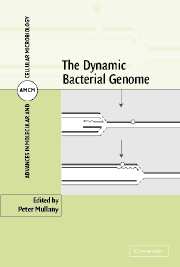Book contents
- Frontmatter
- Contents
- List of Contributors
- PART 1 Basic Mechanisms of Genome Rearrangement in Bacteria
- PART 2 Horizontal Gene Transfer and Genome Plasticity
- PART 3 Biological Consequences of the Mobile Genome
- 8 Phase variation and antigenic variation
- 9 Pathogenicity islands
- 10 Biological consequences for bacteria of homologous recombination
- 11 Horizontal gene transfer and bacterial genomic legacies
- Index
- Plate Section
- References
9 - Pathogenicity islands
Published online by Cambridge University Press: 06 August 2009
- Frontmatter
- Contents
- List of Contributors
- PART 1 Basic Mechanisms of Genome Rearrangement in Bacteria
- PART 2 Horizontal Gene Transfer and Genome Plasticity
- PART 3 Biological Consequences of the Mobile Genome
- 8 Phase variation and antigenic variation
- 9 Pathogenicity islands
- 10 Biological consequences for bacteria of homologous recombination
- 11 Horizontal gene transfer and bacterial genomic legacies
- Index
- Plate Section
- References
Summary
Infections caused by microbial pathogens are a major global health problem not only in developing countries, but also in the industrial world. Similarly, there are numerous diseases of animals and plants due to bacterial infections. Pathogenic bacteria can be found among various bacterial species, and the determination of the factors that are responsible for virulence of a certain bacterium has long been one of the main interests in microbial research. In the early 1990s, new insights into the evolution of bacterial pathogens were gained by the development of the concept of pathogenicity islands (PAIs), which are the topic of this chapter. Since then, the advances in genomics have led into a new area of pathogen research, with increasing knowledge of completely sequenced bacterial genomes.
The prokaryotic genome can be generally divided into a core gene pool encompassing those genes that encode essential functions, such as DNA replication, cell division, nucleotide turnover, and key metabolic pathways, and a flexible gene pool containing genes that are only required under certain environmental conditions. The core genes are normally encoded in stable regions of the chromosome and exhibit a relatively homogeneous G+C content. In contrast, genes of the flexible gene pool are often found on mobile genetic elements and are preferentially transmitted between different organisms by natural transformation (the uptake of naked DNA), phage-mediated transduction, or conjugation (the unidirectional transfer of DNA from a donor to a recipient via intimate cell-to-cell contact).
- Type
- Chapter
- Information
- The Dynamic Bacterial Genome , pp. 323 - 350Publisher: Cambridge University PressPrint publication year: 2005

